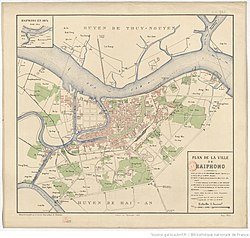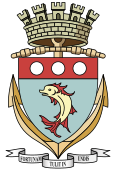User:Donald Trung/Haiphong under French rule/Infobox
Appearance
Draft 2 (Better map)
[edit]City of Haiphong Ville de Haïphong Thành-phố Hải-Phòng 城庯海防 | |||||||||||||||
|---|---|---|---|---|---|---|---|---|---|---|---|---|---|---|---|
| 1883–1945 1946–1954 | |||||||||||||||
| Motto: Fortunam tulit in undis (Latin) "Fortune lies in the waves" | |||||||||||||||
 Haiphong in 1929 (Bảo Đại 4). | |||||||||||||||
| Status | Concession city | ||||||||||||||
| Official languages | French Vietnamese Classical Chinese[a] | ||||||||||||||
| Demonym(s) | Haiphongese[b] | ||||||||||||||
| Government | Municipalité de première classe | ||||||||||||||
| Đốc lý Pháp | |||||||||||||||
| Thị trưởng | |||||||||||||||
| Legislature | Municipal council (de jure) Mayoral decree (de facto) | ||||||||||||||
| Historical era | New Imperialism, Cold War | ||||||||||||||
| 25 August 1883 | |||||||||||||||
| 6 June 1884 | |||||||||||||||
| 19 July 1888 | |||||||||||||||
• The Đồng Khánh Emperor officially cedes the cities of Hanoi, Hải Phòng, and Tourane (Đà Nẵng) to direct French rule | 1–3 October 1888 | ||||||||||||||
| September 1940 | |||||||||||||||
| 9 March 1945 | |||||||||||||||
• Proclamation of independence of the Empire of Vietnam | 11 March 1945 | ||||||||||||||
| 23 November 1946 | |||||||||||||||
| 21 July 1954 | |||||||||||||||
| Population | |||||||||||||||
• 1940 | 73.000[3] | ||||||||||||||
| Currency | Vietnamese cash (1883—1945) French Indochinese piastre (1885—1953) Japanese military yen (1940–1945) South Vietnamese đồng (1953—1954) | ||||||||||||||
| |||||||||||||||
| Today part of | Haiphong, Vietnam | ||||||||||||||
| |||||||||||||||
- ^ Địa giới Hà Nội thời Pháp xâm lược, tạm chiếm Archived 2017-03-10 at the Wayback Machine, VietnamPlus, truy cập ngày 3 tháng 6 năm 2017.
- ^ Nguyễn Ngọc Tiến, Tỉnh Hà Nội và thành phố Hà Nội Archived 2017-12-01 at the Wayback Machine, Hà Nội mới, truy cập ngày 3 tháng 6 năm 2017.
- ^ Baron & La Salle. Dictionnaire des Communes administratif et militaire, France métropolitaine et France d'outre-mer. Paris: Charles-Lavauzelle & Cie, 1949. (in French).
Draft 1.5 (Sloppily left in Hanoi-related things)
[edit]City of Haiphong Ville de Haïphong Thành-phố Hải-Phòng 城庯海防 | |||||||||||||||
|---|---|---|---|---|---|---|---|---|---|---|---|---|---|---|---|
| 1883–1945 1946–1954 | |||||||||||||||
| Motto: Fortunam tulit in undis (Latin) "Fortune lies in the waves" | |||||||||||||||
 Haiphong in 1920 (Khải Định 5). | |||||||||||||||
| Status | Concession city | ||||||||||||||
| Official languages | French Vietnamese Classical Chinese[a] | ||||||||||||||
| Government | Municipalité de première classe | ||||||||||||||
| Đốc lý Pháp | |||||||||||||||
| Thị trưởng | |||||||||||||||
| Legislature | Municipal council (de jure) Mayoral decree (de facto) | ||||||||||||||
| Historical era | New Imperialism, Cold War | ||||||||||||||
| 25 August 1883 | |||||||||||||||
| 6 June 1884 | |||||||||||||||
| 19 July 1888 | |||||||||||||||
• The Đồng Khánh Emperor officially cedes the cities of Hanoi, Hải Phòng, and Tourane (Đà Nẵng) to direct French rule | 1–3 October 1888 | ||||||||||||||
| September 1940 | |||||||||||||||
| 9 March 1945 | |||||||||||||||
• Proclamation of independence of the Empire of Vietnam | 11 March 1945 | ||||||||||||||
| 23 November 1946 | |||||||||||||||
| 21 July 1954 | |||||||||||||||
| Population | |||||||||||||||
• 1940 | 73.000[3] | ||||||||||||||
| Currency | Vietnamese cash (1883—1945) French Indochinese piastre (1885—1953) Japanese military yen (1940–1945) South Vietnamese đồng (1953—1954) | ||||||||||||||
| |||||||||||||||
| Today part of | Haiphong, Vietnam | ||||||||||||||
| |||||||||||||||
- ^ Địa giới Hà Nội thời Pháp xâm lược, tạm chiếm Archived 2017-03-10 at the Wayback Machine, VietnamPlus, truy cập ngày 3 tháng 6 năm 2017.
- ^ Nguyễn Ngọc Tiến, Tỉnh Hà Nội và thành phố Hà Nội Archived 2017-12-01 at the Wayback Machine, Hà Nội mới, truy cập ngày 3 tháng 6 năm 2017.
- ^ Baron & La Salle. Dictionnaire des Communes administratif et militaire, France métropolitaine et France d'outre-mer. Paris: Charles-Lavauzelle & Cie, 1949. (in French).
Draft 1
[edit]City of Haiphong Ville de Haïphong Thành-phố Hải-Phòng 城庯海防 | |||||||||||||
|---|---|---|---|---|---|---|---|---|---|---|---|---|---|
| 1883–1945 1946–1954 | |||||||||||||
| Motto: Fortunam tulit in undis (Latin) "Fortune lies in the waves" | |||||||||||||
| Status | Concession city | ||||||||||||
| Official languages | French Vietnamese Classical Chinese[a] | ||||||||||||
| Government | Municipalité de première classe | ||||||||||||
| Đốc lý Pháp | |||||||||||||
| Thị trưởng | |||||||||||||
| Legislature | Municipal council (de jure) Mayoral decree (de facto) | ||||||||||||
| Historical era | New Imperialism, Cold War | ||||||||||||
| 25 August 1883 | |||||||||||||
| 6 June 1884 | |||||||||||||
| 19 July 1888 | |||||||||||||
• The Đồng Khánh Emperor officially cedes the cities of Hanoi, Hải Phòng, and Tourane (Đà Nẵng) to direct French rule | 1–3 October 1888 | ||||||||||||
| September 1940 | |||||||||||||
• The Bảo Đại Emperor cedes land from the Hà Đông province to Hanoi | 11 July 1942; 1 January 1943 | ||||||||||||
| 9 March 1945 | |||||||||||||
• Proclamation of independence of the Empire of Vietnam | 11 March 1945 | ||||||||||||
| 19 December 1946 – 18 February 1947 | |||||||||||||
| 21 July 1954 | |||||||||||||
| Currency | Vietnamese cash (1883—1945) French Indochinese piastre (1885—1953) Japanese military yen (1940–1945) South Vietnamese đồng (1953—1954) | ||||||||||||
| |||||||||||||
| Today part of | Haiphong, Vietnam | ||||||||||||
| |||||||||||||
- ^ Địa giới Hà Nội thời Pháp xâm lược, tạm chiếm Archived 2017-03-10 at the Wayback Machine, VietnamPlus, truy cập ngày 3 tháng 6 năm 2017.
- ^ Nguyễn Ngọc Tiến, Tỉnh Hà Nội và thành phố Hà Nội Archived 2017-12-01 at the Wayback Machine, Hà Nội mới, truy cập ngày 3 tháng 6 năm 2017.

